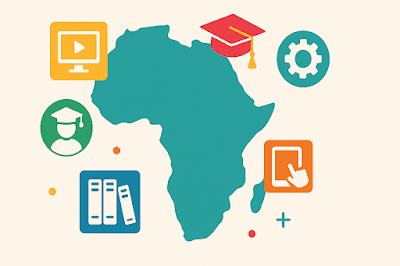 |
| Africa's Top 5 Education Trends to Keep an Eye on |
The educational landscape in Africa is rapidly changing. Africa's education
system is changing more quickly than ever before due to factors like population
growth, the adoption of technology, and urgent social needs. It is evident that
innovation, equity, and digitalization are at the core of this change as 2025
goes on.
Here are five important education trends to watch throughout the continent,
regardless of your role as a teacher, legislator, parent, or EdTech enthusiast.
1. Using digital tools in the classroom
Digital tools are becoming more and more common in schools from Nairobi to Accra, not only for distance learning but also as an essential component of regular classroom instruction.Both urban and rural students are benefiting from platforms like Google Classroom, WhatsApp Groups, and Kolibri.
More people have access to digital tools, and educators are growing more comfortable utilizing them for content delivery, collaboration, and assessments.
2. Innovative EdTech Startups
The EdTech sector in Africa is flourishing or let us just say about to flourish. For students at all levels, businesses like Eneza Education, Moringa School in Kenya, and uLesson in Nigeria are developing locally relevant solutions. Frequently more quickly than traditional educational systems can, these startups are enhancing affordability, access, and engagement.3. Using AI in Education
Teachers in Africa are experimenting with ChatGPT and other artificial intelligence tools for lesson planning, grading, and content production. Apps with AI capabilities are also being used to give students individualized learning paths. Although AI won't take the place of teachers, it is developing into a useful tool, particularly in settings with a shortage of personnel and resources.4. Pay Attention to Skills, Not Just Content
Africa's curricula are moving toward competency-based learning, emphasizing problem-solving, creativity, teamwork, and digital literacy skills that are essential in today's workforce.As countries like Ghana, Rwanda, and South Africa implement skill-oriented reforms to better prepare students for the future, traditional rote learning is coming under pressure.
5. Training & Empowerment of Teachers
Without empowered teachers, no change can occur. Programs for teacher development that emphasize inclusive practices, digital skills, and student-centered pedagogy are being implemented by ministries and non-governmental organizations. The cornerstone of a digitally literate classroom is a teacher who is proficient in technology.The youthful population of Africa presents both opportunities and challenges. Africa may be at the forefront of the next wave of educational innovations worldwide if its educational systems keep innovating and making prudent investments.
Stakeholders can make well-informed decisions that promote inclusive, impactful, and sustainable learning throughout the continent by keeping abreast of these trends.
You might also like: The significance of Digital Literacy for African Students Today






0 Comments